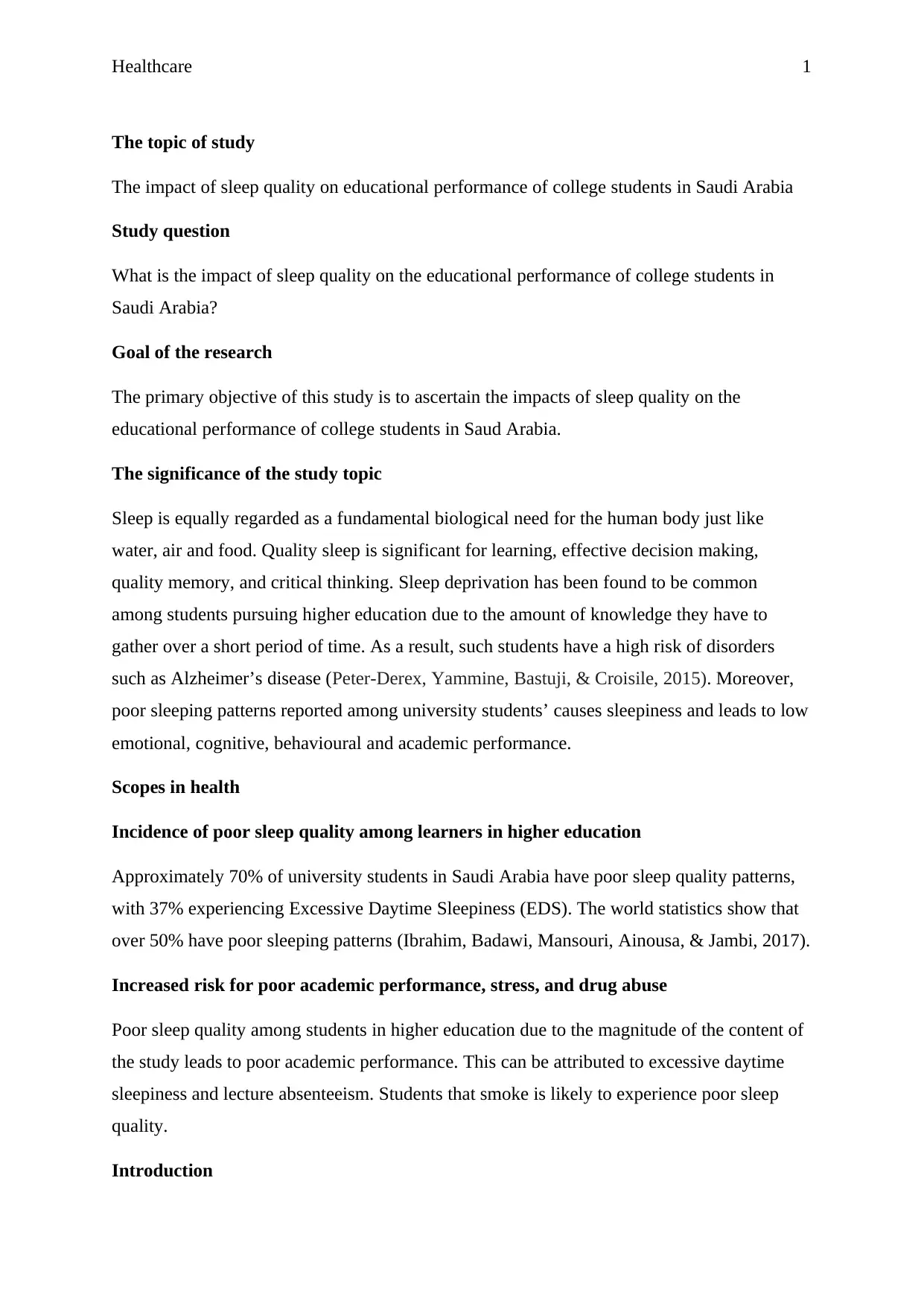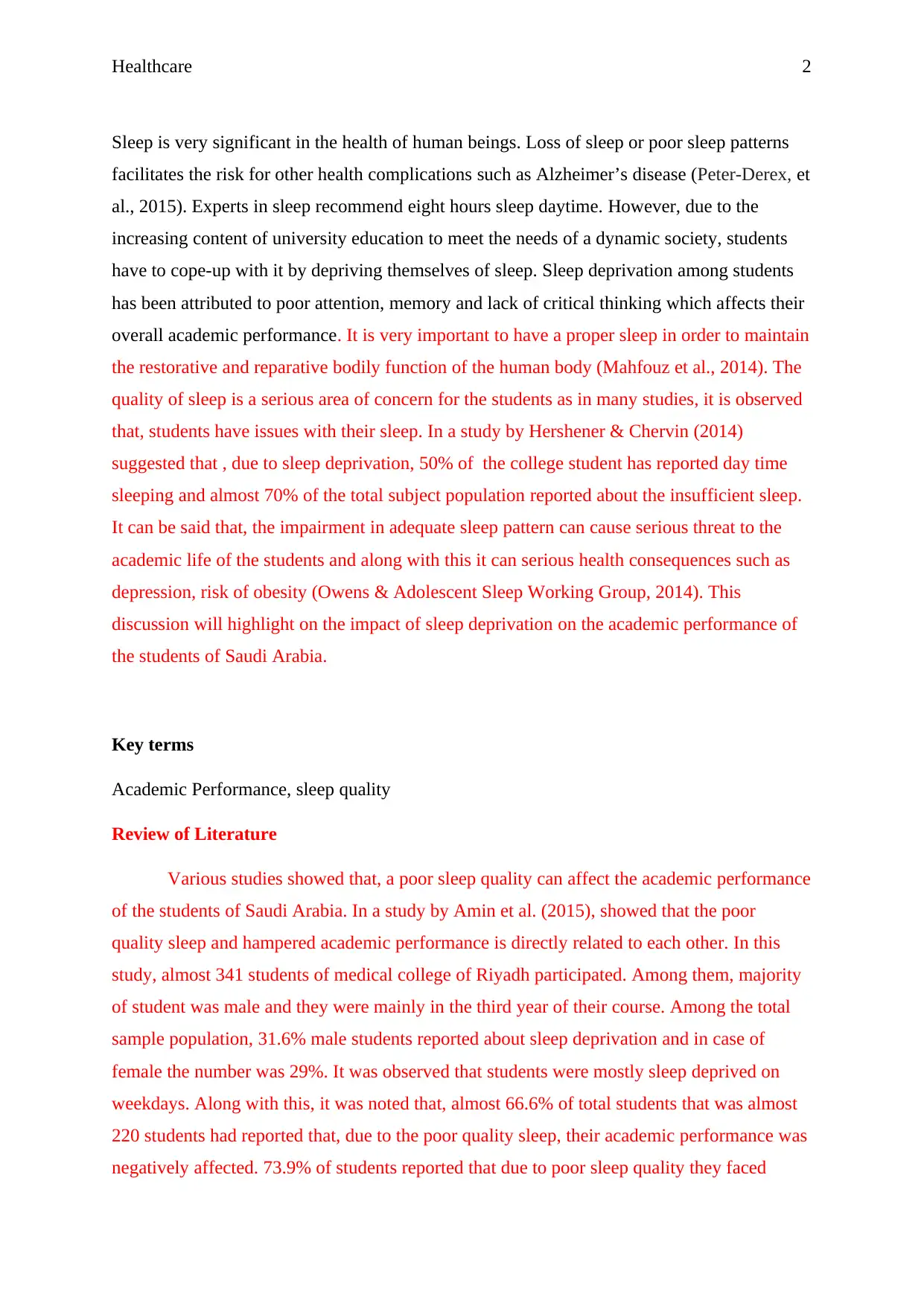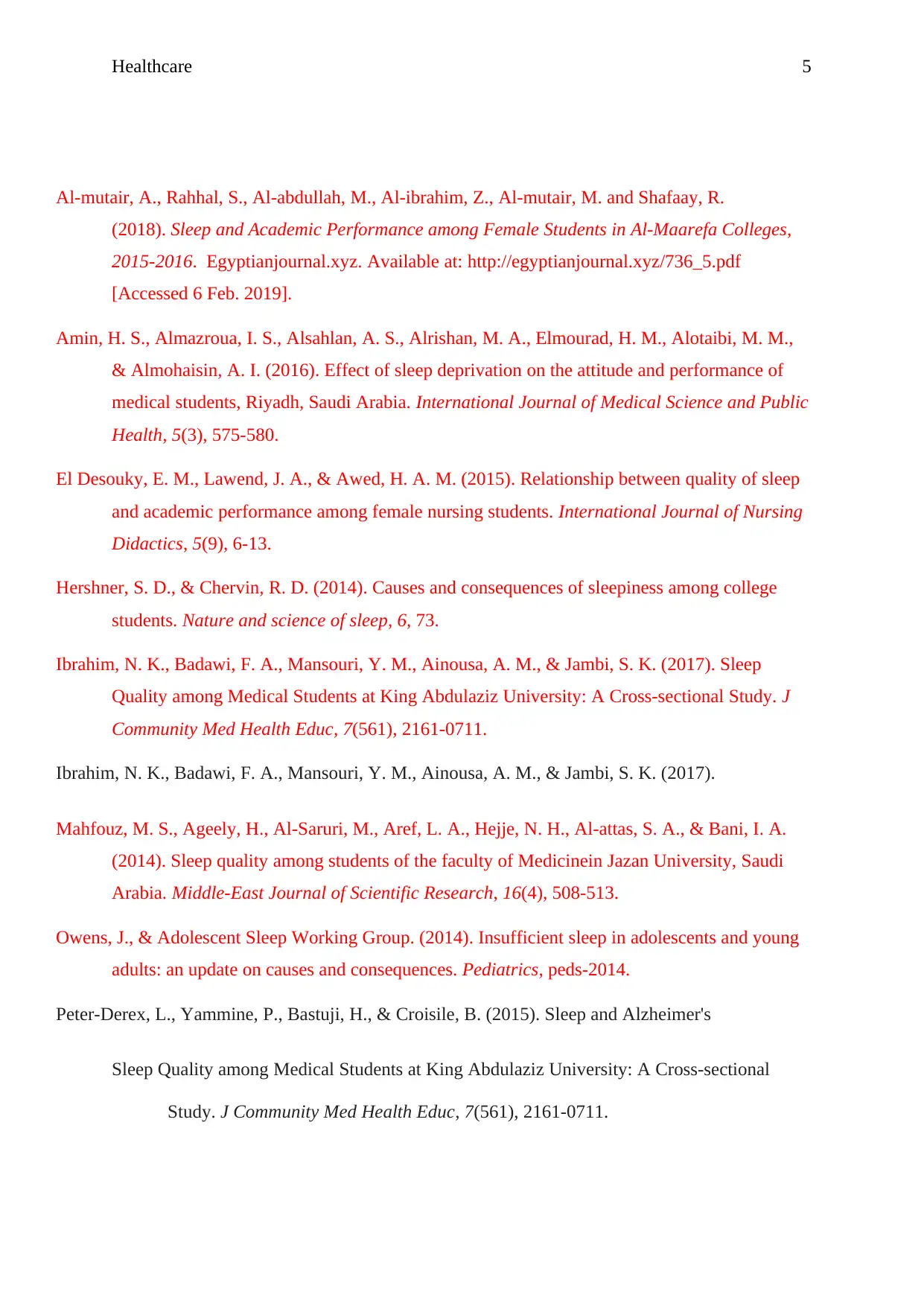Sleep Quality and Academic Performance: A Saudi Study
VerifiedAdded on 2023/04/20
|5
|1710
|404
Report
AI Summary
This report investigates the significant impact of sleep quality on the educational performance of college students in Saudi Arabia. The study focuses on the high prevalence of poor sleep quality among these students and its detrimental effects on their academic outcomes. The research highlights that approximately 70% of university students in Saudi Arabia experience poor sleep patterns, leading to issues such as excessive daytime sleepiness, poor academic performance, and increased risk of health complications. The report reviews existing literature, including studies conducted in Saudi Arabia, demonstrating a direct correlation between poor sleep quality and decreased academic performance. Findings indicate that students with poor sleep quality face challenges in understanding lectures, concentrating, making decisions, and attending classes. The report emphasizes the need for interventions to improve sleep quality among students to enhance their cognitive functions and overall academic success. It also references studies that show a connection between sleep deprivation and health risks like Alzheimer's disease. The report uses key terms like academic performance and sleep quality to underline the importance of this topic and concludes by underscoring the need for better sleep hygiene practices among college students in Saudi Arabia to improve their academic performance and overall well-being.

Healthcare 1
The topic of study
The impact of sleep quality on educational performance of college students in Saudi Arabia
Study question
What is the impact of sleep quality on the educational performance of college students in
Saudi Arabia?
Goal of the research
The primary objective of this study is to ascertain the impacts of sleep quality on the
educational performance of college students in Saud Arabia.
The significance of the study topic
Sleep is equally regarded as a fundamental biological need for the human body just like
water, air and food. Quality sleep is significant for learning, effective decision making,
quality memory, and critical thinking. Sleep deprivation has been found to be common
among students pursuing higher education due to the amount of knowledge they have to
gather over a short period of time. As a result, such students have a high risk of disorders
such as Alzheimer’s disease (Peter-Derex, Yammine, Bastuji, & Croisile, 2015). Moreover,
poor sleeping patterns reported among university students’ causes sleepiness and leads to low
emotional, cognitive, behavioural and academic performance.
Scopes in health
Incidence of poor sleep quality among learners in higher education
Approximately 70% of university students in Saudi Arabia have poor sleep quality patterns,
with 37% experiencing Excessive Daytime Sleepiness (EDS). The world statistics show that
over 50% have poor sleeping patterns (Ibrahim, Badawi, Mansouri, Ainousa, & Jambi, 2017).
Increased risk for poor academic performance, stress, and drug abuse
Poor sleep quality among students in higher education due to the magnitude of the content of
the study leads to poor academic performance. This can be attributed to excessive daytime
sleepiness and lecture absenteeism. Students that smoke is likely to experience poor sleep
quality.
Introduction
The topic of study
The impact of sleep quality on educational performance of college students in Saudi Arabia
Study question
What is the impact of sleep quality on the educational performance of college students in
Saudi Arabia?
Goal of the research
The primary objective of this study is to ascertain the impacts of sleep quality on the
educational performance of college students in Saud Arabia.
The significance of the study topic
Sleep is equally regarded as a fundamental biological need for the human body just like
water, air and food. Quality sleep is significant for learning, effective decision making,
quality memory, and critical thinking. Sleep deprivation has been found to be common
among students pursuing higher education due to the amount of knowledge they have to
gather over a short period of time. As a result, such students have a high risk of disorders
such as Alzheimer’s disease (Peter-Derex, Yammine, Bastuji, & Croisile, 2015). Moreover,
poor sleeping patterns reported among university students’ causes sleepiness and leads to low
emotional, cognitive, behavioural and academic performance.
Scopes in health
Incidence of poor sleep quality among learners in higher education
Approximately 70% of university students in Saudi Arabia have poor sleep quality patterns,
with 37% experiencing Excessive Daytime Sleepiness (EDS). The world statistics show that
over 50% have poor sleeping patterns (Ibrahim, Badawi, Mansouri, Ainousa, & Jambi, 2017).
Increased risk for poor academic performance, stress, and drug abuse
Poor sleep quality among students in higher education due to the magnitude of the content of
the study leads to poor academic performance. This can be attributed to excessive daytime
sleepiness and lecture absenteeism. Students that smoke is likely to experience poor sleep
quality.
Introduction
Paraphrase This Document
Need a fresh take? Get an instant paraphrase of this document with our AI Paraphraser

Healthcare 2
Sleep is very significant in the health of human beings. Loss of sleep or poor sleep patterns
facilitates the risk for other health complications such as Alzheimer’s disease (Peter-Derex, et
al., 2015). Experts in sleep recommend eight hours sleep daytime. However, due to the
increasing content of university education to meet the needs of a dynamic society, students
have to cope-up with it by depriving themselves of sleep. Sleep deprivation among students
has been attributed to poor attention, memory and lack of critical thinking which affects their
overall academic performance. It is very important to have a proper sleep in order to maintain
the restorative and reparative bodily function of the human body (Mahfouz et al., 2014). The
quality of sleep is a serious area of concern for the students as in many studies, it is observed
that, students have issues with their sleep. In a study by Hershener & Chervin (2014)
suggested that , due to sleep deprivation, 50% of the college student has reported day time
sleeping and almost 70% of the total subject population reported about the insufficient sleep.
It can be said that, the impairment in adequate sleep pattern can cause serious threat to the
academic life of the students and along with this it can serious health consequences such as
depression, risk of obesity (Owens & Adolescent Sleep Working Group, 2014). This
discussion will highlight on the impact of sleep deprivation on the academic performance of
the students of Saudi Arabia.
Key terms
Academic Performance, sleep quality
Review of Literature
Various studies showed that, a poor sleep quality can affect the academic performance
of the students of Saudi Arabia. In a study by Amin et al. (2015), showed that the poor
quality sleep and hampered academic performance is directly related to each other. In this
study, almost 341 students of medical college of Riyadh participated. Among them, majority
of student was male and they were mainly in the third year of their course. Among the total
sample population, 31.6% male students reported about sleep deprivation and in case of
female the number was 29%. It was observed that students were mostly sleep deprived on
weekdays. Along with this, it was noted that, almost 66.6% of total students that was almost
220 students had reported that, due to the poor quality sleep, their academic performance was
negatively affected. 73.9% of students reported that due to poor sleep quality they faced
Sleep is very significant in the health of human beings. Loss of sleep or poor sleep patterns
facilitates the risk for other health complications such as Alzheimer’s disease (Peter-Derex, et
al., 2015). Experts in sleep recommend eight hours sleep daytime. However, due to the
increasing content of university education to meet the needs of a dynamic society, students
have to cope-up with it by depriving themselves of sleep. Sleep deprivation among students
has been attributed to poor attention, memory and lack of critical thinking which affects their
overall academic performance. It is very important to have a proper sleep in order to maintain
the restorative and reparative bodily function of the human body (Mahfouz et al., 2014). The
quality of sleep is a serious area of concern for the students as in many studies, it is observed
that, students have issues with their sleep. In a study by Hershener & Chervin (2014)
suggested that , due to sleep deprivation, 50% of the college student has reported day time
sleeping and almost 70% of the total subject population reported about the insufficient sleep.
It can be said that, the impairment in adequate sleep pattern can cause serious threat to the
academic life of the students and along with this it can serious health consequences such as
depression, risk of obesity (Owens & Adolescent Sleep Working Group, 2014). This
discussion will highlight on the impact of sleep deprivation on the academic performance of
the students of Saudi Arabia.
Key terms
Academic Performance, sleep quality
Review of Literature
Various studies showed that, a poor sleep quality can affect the academic performance
of the students of Saudi Arabia. In a study by Amin et al. (2015), showed that the poor
quality sleep and hampered academic performance is directly related to each other. In this
study, almost 341 students of medical college of Riyadh participated. Among them, majority
of student was male and they were mainly in the third year of their course. Among the total
sample population, 31.6% male students reported about sleep deprivation and in case of
female the number was 29%. It was observed that students were mostly sleep deprived on
weekdays. Along with this, it was noted that, almost 66.6% of total students that was almost
220 students had reported that, due to the poor quality sleep, their academic performance was
negatively affected. 73.9% of students reported that due to poor sleep quality they faced

Healthcare 3
problems in understanding the lectures whereas 45.3% had reported about lack of
concentration during the lectures due to poor quality sleep. Moreover, the 63.6 % students
reported that they faced problems while taking any decisions due to the poor quality sleep
and 76.3% had failed to reach their class on time due to sleep deprivation. In another study it
was observed that students were feeling sleepy during the time of the lectures and they had
reported difficulties due to their poor sleep quality. In that study, almost 150 female college
students participated and among them 71% of students reported tired and almost 87% of the
students felt sleepy during the lectures as they had not a good quality sleep (Al- mutairi et al.,
2018). Another study by ( Desouky et al., 2015) , conducted among the female nursing
students of College of Nursing and Allied Health Sciences in Jazan city, showed that 62.5%
of the total sample population (n= 200) had the issue of poor quality of sleep and it hampered
the academic performances of the students. In that study, it was established that a good sleep
quality had positive statistical correlation with the good academic performance along with a
high statistically significant p value. Moreover, the study revealed that almost 47% of the
total sample population faced simple problems along with difficulties in their daily academic
activities. This two factors had statistically significant p value also. The study of also
supported the fact that poor quality sleep contributed to the hampering of the academic life of
adolescents by lowering their cognitive functions as those students had poor quality sleep. In
addition, this study also hampered the decision making process of the adolescent students
(Owens & Adolescent Sleep Working Group, 2014). The study of Ibrahim et al. (2017),
conducted among the medical students of King Abdulaziz University (KAU), Jeddah, Saudi
Arabia, showed that poor sleep quality can hamper the academic performance of the students
and it may hamper their quality of work as practitioners in future. In their study, 576 students
were selected through a random sampling technique. This study showed that students who
secured less than 50% in their previous semester, were poor sleepers while comparing with
others and poor academic performances and poor quality of sleep has significant statistical
differences with a p value of < 0.001 (p<0.001). In addition, poor sleep quality is also
promoting daytime sleepiness among the poor sleepers with a significant p value (p<0.05).
problems in understanding the lectures whereas 45.3% had reported about lack of
concentration during the lectures due to poor quality sleep. Moreover, the 63.6 % students
reported that they faced problems while taking any decisions due to the poor quality sleep
and 76.3% had failed to reach their class on time due to sleep deprivation. In another study it
was observed that students were feeling sleepy during the time of the lectures and they had
reported difficulties due to their poor sleep quality. In that study, almost 150 female college
students participated and among them 71% of students reported tired and almost 87% of the
students felt sleepy during the lectures as they had not a good quality sleep (Al- mutairi et al.,
2018). Another study by ( Desouky et al., 2015) , conducted among the female nursing
students of College of Nursing and Allied Health Sciences in Jazan city, showed that 62.5%
of the total sample population (n= 200) had the issue of poor quality of sleep and it hampered
the academic performances of the students. In that study, it was established that a good sleep
quality had positive statistical correlation with the good academic performance along with a
high statistically significant p value. Moreover, the study revealed that almost 47% of the
total sample population faced simple problems along with difficulties in their daily academic
activities. This two factors had statistically significant p value also. The study of also
supported the fact that poor quality sleep contributed to the hampering of the academic life of
adolescents by lowering their cognitive functions as those students had poor quality sleep. In
addition, this study also hampered the decision making process of the adolescent students
(Owens & Adolescent Sleep Working Group, 2014). The study of Ibrahim et al. (2017),
conducted among the medical students of King Abdulaziz University (KAU), Jeddah, Saudi
Arabia, showed that poor sleep quality can hamper the academic performance of the students
and it may hamper their quality of work as practitioners in future. In their study, 576 students
were selected through a random sampling technique. This study showed that students who
secured less than 50% in their previous semester, were poor sleepers while comparing with
others and poor academic performances and poor quality of sleep has significant statistical
differences with a p value of < 0.001 (p<0.001). In addition, poor sleep quality is also
promoting daytime sleepiness among the poor sleepers with a significant p value (p<0.05).
⊘ This is a preview!⊘
Do you want full access?
Subscribe today to unlock all pages.

Trusted by 1+ million students worldwide

Healthcare 4
References
References
Paraphrase This Document
Need a fresh take? Get an instant paraphrase of this document with our AI Paraphraser

Healthcare 5
Al-mutair, A., Rahhal, S., Al-abdullah, M., Al-ibrahim, Z., Al-mutair, M. and Shafaay, R.
(2018). Sleep and Academic Performance among Female Students in Al-Maarefa Colleges,
2015-2016. Egyptianjournal.xyz. Available at: http://egyptianjournal.xyz/736_5.pdf
[Accessed 6 Feb. 2019].
Amin, H. S., Almazroua, I. S., Alsahlan, A. S., Alrishan, M. A., Elmourad, H. M., Alotaibi, M. M.,
& Almohaisin, A. I. (2016). Effect of sleep deprivation on the attitude and performance of
medical students, Riyadh, Saudi Arabia. International Journal of Medical Science and Public
Health, 5(3), 575-580.
El Desouky, E. M., Lawend, J. A., & Awed, H. A. M. (2015). Relationship between quality of sleep
and academic performance among female nursing students. International Journal of Nursing
Didactics, 5(9), 6-13.
Hershner, S. D., & Chervin, R. D. (2014). Causes and consequences of sleepiness among college
students. Nature and science of sleep, 6, 73.
Ibrahim, N. K., Badawi, F. A., Mansouri, Y. M., Ainousa, A. M., & Jambi, S. K. (2017). Sleep
Quality among Medical Students at King Abdulaziz University: A Cross-sectional Study. J
Community Med Health Educ, 7(561), 2161-0711.
Ibrahim, N. K., Badawi, F. A., Mansouri, Y. M., Ainousa, A. M., & Jambi, S. K. (2017).
Mahfouz, M. S., Ageely, H., Al-Saruri, M., Aref, L. A., Hejje, N. H., Al-attas, S. A., & Bani, I. A.
(2014). Sleep quality among students of the faculty of Medicinein Jazan University, Saudi
Arabia. Middle-East Journal of Scientific Research, 16(4), 508-513.
Owens, J., & Adolescent Sleep Working Group. (2014). Insufficient sleep in adolescents and young
adults: an update on causes and consequences. Pediatrics, peds-2014.
Peter-Derex, L., Yammine, P., Bastuji, H., & Croisile, B. (2015). Sleep and Alzheimer's
Sleep Quality among Medical Students at King Abdulaziz University: A Cross-sectional
Study. J Community Med Health Educ, 7(561), 2161-0711.
Al-mutair, A., Rahhal, S., Al-abdullah, M., Al-ibrahim, Z., Al-mutair, M. and Shafaay, R.
(2018). Sleep and Academic Performance among Female Students in Al-Maarefa Colleges,
2015-2016. Egyptianjournal.xyz. Available at: http://egyptianjournal.xyz/736_5.pdf
[Accessed 6 Feb. 2019].
Amin, H. S., Almazroua, I. S., Alsahlan, A. S., Alrishan, M. A., Elmourad, H. M., Alotaibi, M. M.,
& Almohaisin, A. I. (2016). Effect of sleep deprivation on the attitude and performance of
medical students, Riyadh, Saudi Arabia. International Journal of Medical Science and Public
Health, 5(3), 575-580.
El Desouky, E. M., Lawend, J. A., & Awed, H. A. M. (2015). Relationship between quality of sleep
and academic performance among female nursing students. International Journal of Nursing
Didactics, 5(9), 6-13.
Hershner, S. D., & Chervin, R. D. (2014). Causes and consequences of sleepiness among college
students. Nature and science of sleep, 6, 73.
Ibrahim, N. K., Badawi, F. A., Mansouri, Y. M., Ainousa, A. M., & Jambi, S. K. (2017). Sleep
Quality among Medical Students at King Abdulaziz University: A Cross-sectional Study. J
Community Med Health Educ, 7(561), 2161-0711.
Ibrahim, N. K., Badawi, F. A., Mansouri, Y. M., Ainousa, A. M., & Jambi, S. K. (2017).
Mahfouz, M. S., Ageely, H., Al-Saruri, M., Aref, L. A., Hejje, N. H., Al-attas, S. A., & Bani, I. A.
(2014). Sleep quality among students of the faculty of Medicinein Jazan University, Saudi
Arabia. Middle-East Journal of Scientific Research, 16(4), 508-513.
Owens, J., & Adolescent Sleep Working Group. (2014). Insufficient sleep in adolescents and young
adults: an update on causes and consequences. Pediatrics, peds-2014.
Peter-Derex, L., Yammine, P., Bastuji, H., & Croisile, B. (2015). Sleep and Alzheimer's
Sleep Quality among Medical Students at King Abdulaziz University: A Cross-sectional
Study. J Community Med Health Educ, 7(561), 2161-0711.
1 out of 5
Related Documents
Your All-in-One AI-Powered Toolkit for Academic Success.
+13062052269
info@desklib.com
Available 24*7 on WhatsApp / Email
![[object Object]](/_next/static/media/star-bottom.7253800d.svg)
Unlock your academic potential
Copyright © 2020–2026 A2Z Services. All Rights Reserved. Developed and managed by ZUCOL.




